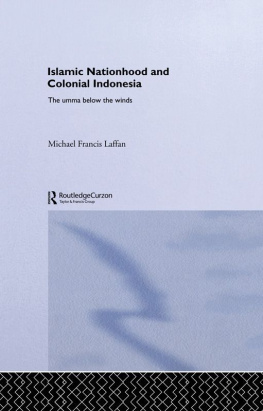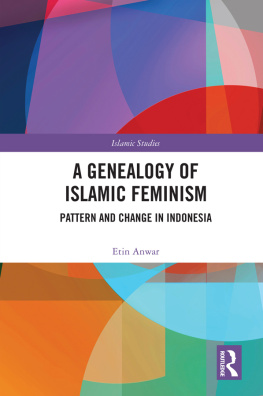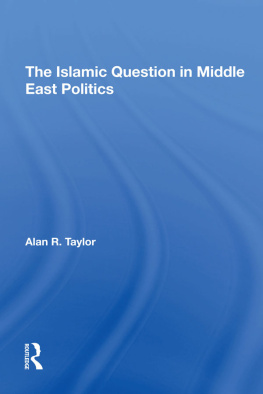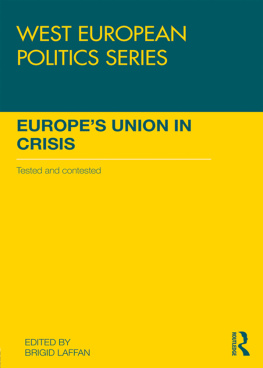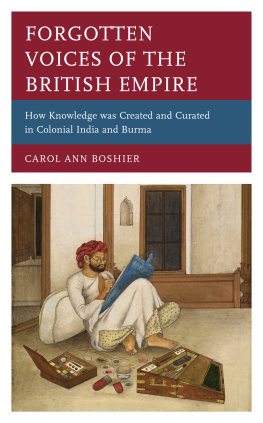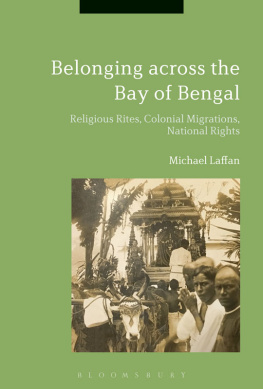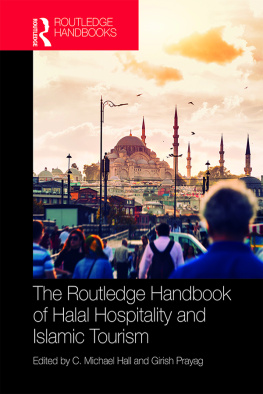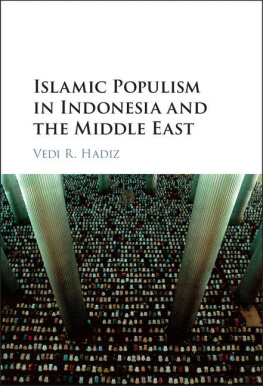Michael Francis Laffan - Islamic Nationhood and Colonial Indonesia (SOAS/Routledge Studies on the Middle East)
Here you can read online Michael Francis Laffan - Islamic Nationhood and Colonial Indonesia (SOAS/Routledge Studies on the Middle East) full text of the book (entire story) in english for free. Download pdf and epub, get meaning, cover and reviews about this ebook. year: 2003, publisher: Taylor and Francis, genre: Religion. Description of the work, (preface) as well as reviews are available. Best literature library LitArk.com created for fans of good reading and offers a wide selection of genres:
Romance novel
Science fiction
Adventure
Detective
Science
History
Home and family
Prose
Art
Politics
Computer
Non-fiction
Religion
Business
Children
Humor
Choose a favorite category and find really read worthwhile books. Enjoy immersion in the world of imagination, feel the emotions of the characters or learn something new for yourself, make an fascinating discovery.
- Book:Islamic Nationhood and Colonial Indonesia (SOAS/Routledge Studies on the Middle East)
- Author:
- Publisher:Taylor and Francis
- Genre:
- Year:2003
- Rating:5 / 5
- Favourites:Add to favourites
- Your mark:
- 100
- 1
- 2
- 3
- 4
- 5
Islamic Nationhood and Colonial Indonesia (SOAS/Routledge Studies on the Middle East): summary, description and annotation
We offer to read an annotation, description, summary or preface (depends on what the author of the book "Islamic Nationhood and Colonial Indonesia (SOAS/Routledge Studies on the Middle East)" wrote himself). If you haven't found the necessary information about the book — write in the comments, we will try to find it.
Islamic Nationhood and Colonial Indonesia (SOAS/Routledge Studies on the Middle East) — read online for free the complete book (whole text) full work
Below is the text of the book, divided by pages. System saving the place of the last page read, allows you to conveniently read the book "Islamic Nationhood and Colonial Indonesia (SOAS/Routledge Studies on the Middle East)" online for free, without having to search again every time where you left off. Put a bookmark, and you can go to the page where you finished reading at any time.
Font size:
Interval:
Bookmark:
ISLAMIC NATIONHOOD AND COLONIAL INDONESIA
This book argues that Indonesian nationhood rested to a large degree on a pre-existing sense of Islamic ecumenism. This ecumenism was heightened both under colonial rule and through the experience of life in the Hijaz, where Southeast Asians were simultaneously co-believers in Islam and foreigners to Arabia. The author contrasts the latter experience with life in modern Cairo, where Southeast Asians were drawn to the ideas of Islamic reformism and nationalism.
Laffan also shows how this Cairene experience had an influence on an Indonesian nationalism defined in religious terms. However, rather than leaving the discussion at this point, this book shows how developments in the Middle East and particularly the Saudi takeover of Mecca in 1924 continued to have a profound impact on Indonesia.
Michael Laffan obtained his doctorate from the University of Sydney, 2001. He is currently a research fellow with the International Institute for Asian Studies, Leiden University, working within a project examining the development of religious authority in twentieth-century Indonesia.
This book evolved from the authors doctoral thesis, which won the 2001 Asian Studies Association of Australia Presidents award.
SOAS/ROUTLEDGECURZON STUDIES ON THE MIDDLE EAST
Series Editors
Benjamin C. Fortna Ulrike Freitag
History Department Centre of Near and Middle Eastern Studies
SOAS, University of London
This series features the latest disciplinary approaches to Middle Eastern Studies. It covers the Social Sciences and the Humanities in both the pre-modern and modern periods of the region. While primarily interested in publishing single-authored studies, the series is also open to edited volumes on innovative topics, as well as textbooks and reference works.
ISLAMIC NATIONHOOD AND COLONIAL INDONESIA
The umma below the winds
Michael Francis Laffan
ISLAMIC
NATIONHOOD
AND COLONIAL
INDONESIA
The umma below the winds
Michael Francis Laffan

First published 2003
by RoutledgeCurzon, an imprint of Taylor & Francis
11 New Fetter Lane, London EC4P 4EE
Simultaneously published in the USA and Canada
by RoutledgeCurzon
29 West 35th Street, New York, NY 10001
This edition published in the Taylor & Francis e-Library, 2003.
RoutledgeCurzon is an imprint of the Taylor & Francis Group
2003 Michael Francis Laffan
All rights reserved. No part of this book may be reprinted or reproduced or utilized in any form or by any electronic, mechanical, or other means, now known or hereafter invented, including photocopying and recording, or in any information storage or retrieval system, without permission in writing from the publishers.
British Library Cataloguing in Publication Data
A catalogue record for this book is available from the British Library
Library of Congress Cataloging in Publication Data
A catalog record for this book has been requested
ISBN 0-203-22257-1 Master e-book ISBN
ISBN 0-203-27705-8 (Adobe eReader Format)
ISBN 0-415-29757-5 (Print Edition)
CONTENTS
Plates and Figures
Preface
This study is a revised version of my doctoral dissertation, submitted to the University of Sydney in 2000. Whilst preparing this manuscript I became increasingly aware of the interactive process connecting informants and orientalists that lies behind the discursive screens which are the subject of this book, being questions of community, nation, religion, and modernity. Peter van der Veer has discussed this nexus most eloquently in his Imperial Encounters (2001). Unfortunately I was not able to take that work into account in this study, but it will, I believe, have an influence on any that might follow it. In time too I hope to be able to take up Bill Roffs (2001) challenge to answer how C. Snouck Hurgronje has affected Indonesian Islam in the twentieth century. For now I have sketched but the opening scene, and I hope to use my time as a research fellow within the IIAS project on the dissemination of religious authority in twentieth-century Indonesia to flesh out the continuing contestations and convergences between reformists and traditionalists.
Acknowledgments
It is impossible to pay adequate thanks to the many people who have guided me on the path to the completion of this book, but I will try. I am especially indebted to my supervisors at the University of Sydney, Tony Day, Ahmad Shboul, and Peter Worsley, and then to my unofficial mentors at the Australian National University, Ann Kumar and Ian Proudfoot. Financial support to carry out my research was made possible by the Office of Research and Scholarships at the University of Sydney, which also helped secure additional resources for my jaunts to Egypt, Indonesia, and The Netherlands. In such places, and through the ether, I have also profited greatly from the insights and suggestions of Tony Johns, Nico Kaptein, Bill Roff and Merle Ricklefs. Special thanks go to Merle Ricklefs for giving me the opportunity to assist his own research in a small way, and indeed for keeping the itinerant Laffans clothed and fed in 2001 through a position with the Melbourne Institute for Asian Languages and Societies. The last touches to this book including the images were made at the International Institute for Asian Studies, Leiden University. I am particularly thankful to Jan Just Witkam and Hans van der Velde for help in accessing the photographic collection of the Oriental Manuscripts Section of the Leiden University Library. Permission to reproduce these images, and those found in other works held by Leiden University, is gratefully acknowledged.
Our time abroad and between cities was also made all the more enjoyable by virtue of the strong friendships we forged, and which played their part in the completion of this work. Here I should mention George Miller, Kus Pandey, Sean Robey, Linda Poskitt, Greg Fealy, Sarah and Richard Slattery and Rita Soebardi of Canberra; Jaap and Karla Plugge, Jos van Lent and Luitgard Mols in Holland; Faridah and Kamat of Kuala Lumpur; the Jayusman family, Henri Chambert-Loir, and Debbie Tomasowa in Jakarta; and, of course, the Cairo gang Basil Kiwan, Beth Seymour, Victor Brunsden, Hussam Barakat and Mokhtar Diallo. If I have forgotten anyone, please forgive me.
Finally I wish to thank Judy for putting up with everything, and our children, Faridah and Daniel, whose constantly being moved around must have been a trial. Still I hope that our peregrinations will make them far more interested in the world than might have been the case had I stuck to being a bicycle mechanic or had I been dragged into the government bureaucracy.
A Note On Transliteration and Dates Used in this Book
Indonesianists are often plagued by problems of transliteration. Many older Dutch-influenced spellings have since been reformed to make way for a more simplified phonetic system. Thus /oe/ is now /u/, /tj/ has become /c/, /dj/ is /j/, /sj/ is /sy/, and /j/ is /y/. The Indonesianist dealing with the languages of the Middle East, where many Southeast Asians have lived and worked, is doubly cursed, as many of the sounds not vocalized or irrelevant in Southeast Asian contexts still carry meaning with reference to their shared religious system. These include the long vowels //, // and //; the palatals //, //, //, and //; and the glottal stop // and uvular fricative //.
For the purposes of this book I have given all place names their modern spellings where the same name is used, or I have retained the older name when context decrees that we are speaking of Batavia and Buitenzorg and not Jakarta and Bogor. Personal names have proven far more problematic. In general I have followed two rules. First, to follow the spelling employed by the people themselves wherever possible, and second, to apply the orthography relevant to the context in which they lived and worked. This is further complicated by issues of script as Malay was also written in the Arabic script. But as the long vowels, emphatics, and palatalizations often make little difference to speakers of Austronesian languages, I have opted either to leave them off or use the contemporary European spelling when speaking of the Indies context. To a degree this aids in the identification of individuals. For example Amad Dan of Mecca and Achmad Dachlan of Yogyakarta may be easily differentiated, and we can see that the Hadrami Said Oesman had strong connections with the Netherlands Indies. Nonetheless, for terms deriving from the shared AraboIslamic tradition I have maintained the fully marked Arabic renderings and ignored the Southeast Asian duplication of words to form plurals. Thus I shall write about the
Next pageFont size:
Interval:
Bookmark:
Similar books «Islamic Nationhood and Colonial Indonesia (SOAS/Routledge Studies on the Middle East)»
Look at similar books to Islamic Nationhood and Colonial Indonesia (SOAS/Routledge Studies on the Middle East). We have selected literature similar in name and meaning in the hope of providing readers with more options to find new, interesting, not yet read works.
Discussion, reviews of the book Islamic Nationhood and Colonial Indonesia (SOAS/Routledge Studies on the Middle East) and just readers' own opinions. Leave your comments, write what you think about the work, its meaning or the main characters. Specify what exactly you liked and what you didn't like, and why you think so.

